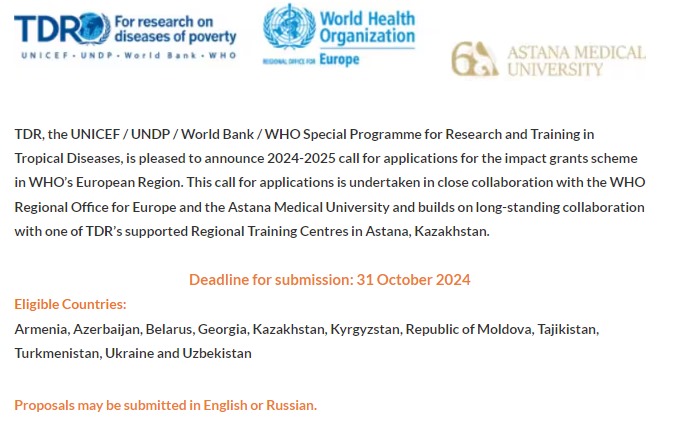|
Call for Applications 2024-2025
TDR Impact Grants Scheme for operational /
|
|
|
Deadline for submission: 31 October 2024 |
|
|
Eligible Countries: |
Armenia, Azerbaijan, Belarus, Georgia, Kazakhstan, Kyrgyzstan, Republic of Moldova, Tajikistan, Turkmenistan, Ukraine and Uzbekistan |
|
Proposals may be submitted in English or Russian. Download a Russian version of this call |
|
|
TDR, the UNICEF / UNDP / World Bank / WHO Special Programme for Research and Training in Tropical Diseases, is pleased to announce 2024-2025 call for applications for the impact grants scheme in WHO’s European Region. This call for applications is undertaken in close collaboration with Astana Medical University and builds on long-standing collaboration with one of TDR’s supported Regional Training Centres in Astana, Kazakhstan. |
|
|
Background |
The 2024–2029 TDR strategy builds on our experience to support country-led implementation research that improves access to and scale-up of health interventions, strategies, and policies and strengthens health systems. We will work with implementers and social innovators, alongside researchers, to help democratize research and demonstrate that it is a useful and practical tool for people tackling health issues on the ground. |
|
TDR will focus on four major global health challenges affecting infectious diseases of poverty using a One Health approach (Human Health+Animal Health+Environment). |
1. Epidemics and outbreaks 2. Control and elimination of diseases of poverty 3. Climate change’s impact on health 4. Resistance to treatment and control agents |
|
Some priority areas may include, but are not limited to: |
|
|
Infectious Diseases and Antimicrobial Resistance (AMR): |
tuberculosis, AMR, HIV/AIDS and other STIs, vector control. |
|
Approaches and models for infectious diseases and non-communicable diseases (NCDs) integrated control: |
research areas to tackle leading causes of mortality in the region in an integrated system, with the link of potential climate change’s impact on integration models. |
|
Health systems strengthening and primary health care: |
research on models of care to improve health system contact, integrated comprehensive primary care services and models that connect primary health care with secondary/tertiary services to provide holistic care. |
|
Health inequities: |
research focused on disparities in health outcomes, particularly among vulnerable populations and approaches to address disparities to primary health care, particularly in rural and underserved areas. |
|
Guided by these priorities of TDR, this call supports the generation of evidence from local research for the prevention and control of infectious diseases of poverty in WHO Regional Office for Europe countries. The Call emphasizes the importance of using implementation/ operational research for ALL of the priority areas. In addition, it welcomes research that links between healthcare delivery, primary health care, disease control programmes with research/academic institutions. |
|
Eligibility criteria |
Applicants submitting proposals must be researchers or health professionals working in a public health institution under the umbrella of a Ministry of Health, university or research institution, or a nongovernmental organization from one of the countries or areas listed above.
Applicants shall demonstrate some prior experience or training in operational and/or implementation research. This might include, but is not limited to, evidence of having been trained in operational /implementation research and or being able to conduct research independently. TDR’s Implementation Research Toolkit, the MOOC (massive open online course) on implementation research and tools from other sources are available. We are committed to equality, diversity, and inclusivity in science. Applications from first-time qualified young researchers and female researchers strongly encouraged. |
|
Evaluation criteria and selection process |
Each application will be screened for compliance with the eligibility criteria. Following this, each eligible application will be assessed independently by at least two reviewers, and scores will be assigned based on the sets of criteria. The highest scoring applications will be recommended for funding. We encourage applicants to review their own application against the criteria above before submitting. |
|
Financial support |
Up to US$ 15 000 per project, including an estimate of open access publication costs. Co-funding from domestic or other sources is encouraged,
Timeframe: Projects should be able to be completed within a period of up to 12 months. |
How to apply |
Applications should be submitted online no later than 30 October 2024 (17:00 CEST), through the eTDR Community Site.
You will need to create an account (if you don’t already have one) on the site and log in before you can apply. |
|
Before you start the online application process, please complete the form linked below:
Download the application
Download the application |
NB: Proposals may be prepared in English or Russian, and uploaded in eTDR system, however, the information you input in this system may only be completed in English, including the proposal title. The application form must be completed, signed appropriately, and uploaded in eTDR as part of your online application. Letter of endorsement from the ministry of health (or other ministry) or a health agency should be included. Please also include all investigators' current curriculum vitae (CV). Incomplete applications will not be considered. If you encounter technical issues with the online submission, please consult the document with instructions on how to apply to Call for Proposals in eTDR system. |
|
In case of questions/information related to administrative documentation, please contact: |
Dr Garry Aslanyan, aslanyang@who.int and Mrs Zarina Khamitova, Zarina.khamitova@gmail.com
In case of technical issues with the Ms Elisabetta Dessi (dessie@who.int) |


